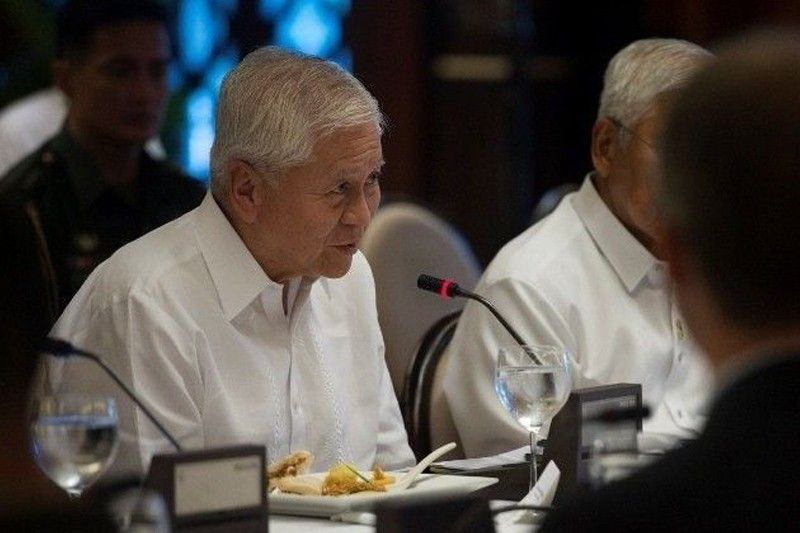‘Philippines, US must clearly convey message of enforcing MDT’

MANILA, Philippines — The Philippines and the United States have to clearly convey the message of enforcing the 1951 US-Philippine Mutual Defense Treaty (MDT) to China to prevent conflict, as the country needs to recover from the Duterte administration’s seemingly mindless pursuit of pro-China policies and compromising the security alliance with Washington, former foreign secretary Albert del Rosario said.
Del Rosario remarked on the recent proposals to review the MDT, including from the Philippine Department of National Defense, apparently based on the ambiguity of the text of the 70-year-old treaty.
The country’s former top diplomat believes the MDT “can be made relevant in the South China Sea without need of formal renegotiation.”
“We are of the humble view that what is important at this time is not so much the text of the MDT, as the political will and commitment of the US and the Philippines in enforcing the treaty,” Del Rosario said in a virtual forum organized by the Stratbase ADR Institute on Thursday to mark the 70th anniversary of the MDT.
He said the Philippines and the US need to continue their security dialogue to reach a common understanding on how the MDT will be applied in particular situations.
“As shown by the renewed commitments of the US to the MDT declared in 2019 and 2021, it is the parties’ actual political will and commitment that will make the MDT effective and credible especially in the South China Sea,” Del Rosario said.
“It is important that the parties are able to clearly convey the message of enforcing the MDT to an aggressor like China. Through this, a conflict hopefully becomes preventable through credible deterrence,” he added.
The commitments of the US and the Philippines to the MDT, he said, can be made ironclad if they are anchored on their respective national interests.
He noted that it is critical that there be a convergence of interests, will and purpose between the US and the Philippines to make the MDT effective and credible against a third party aggressor.
Defense Secretary Delfin Lorenzana disclosed during the forum that China had opposed the review of the MDT that would trigger US treaty obligations in any armed attack on Philippine forces, or attempts to take its territory through the use of force.
The MDT provides that the Philippines and the US will come to each other’s aid in case of armed attacks on Philippine forces, aircraft and republic vessels in the South China Sea.
The defense chief revealed that a former Chinese ambassador came to him when he first brought up the revisiting of the defense treaty.
The Chinese envoy, according to Lorenzana, told him not to touch the MDT.
Altough Lorenzana did not name the Chinese envoy, China’s top diplomat in the Philippines was Zhao Jianhua, who ended his tour of duty in October 2019 after five years as China’s top diplomat in the county.
He said the US welcomed a review of the MDT but an “outside party” wanted the Philippines to “leave it as it is.”
With the consolidating support of the Arbitral Award in the international community, Del Rosario said the Philippines should also continue to build security alliances with like-minded countries in addition to the MDT.
According to Del Rosario, the Philippine government should actively build on this support by entering into agreements with countries to implement the award, welcome and join joint patrols and freedom of navigation and overflight operations conducted by the US, United Kingdom, France, Australia and Japan; and the Philippines should modernize its navy, air force and military and develop its own credible defense posture to protect its land and waters from China’s incursions.
“We regret to say that we need to recover from the damage inflicted by the Duterte administration, which mindlessly pursued President Duterte’s self-professed ‘love’ for Chinese President Xi Jinping, treating the 2016 UNCLOS Award as a ‘scrap of paper,’ and in compromising our security alliance with the US – as in President Duterte’s threat to terminate the Visiting Forces Agreement, an implementing agreement of the MDT,” Del Rosario stressed, referencing the UN Convention on the Law of the Sea.
The US publicly committed, through the MDT, that it will back the Philippines in the event of a Chinese armed attack against Philippine armed forces, public vessels or aircraft which are rightfully stationed or transiting in the South China Sea, including the West Philippine Sea.
US “alignment” with the UNCLOS award, Del Rosario said, also means that the US is siding with Vietnam, Malaysia, Indonesia and Brunei which primarily rely on UNCLOS in defending their maritime rights against China’s illegal and historically baseless nine-dash line claim.
- Latest
- Trending





























